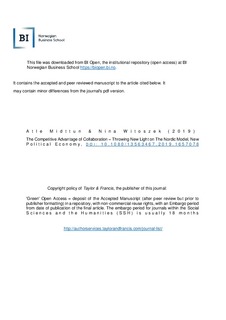| dc.contributor.author | Midttun, Atle | |
| dc.contributor.author | Witoszek, Nina | |
| dc.date.accessioned | 2020-01-24T13:14:11Z | |
| dc.date.available | 2020-01-24T13:14:11Z | |
| dc.date.created | 2019-10-09T11:45:52Z | |
| dc.date.issued | 2019 | |
| dc.identifier.issn | 1356-3467 | |
| dc.identifier.uri | http://hdl.handle.net/11250/2637852 | |
| dc.description.abstract | In one of the most influential contributions to modern political economy, Hall and Soskice have launched a distinction between ‘liberal’ and ‘coordinated’ market economies, placing the Nordic countries firmly in the latter category. We argue that, while the H&S distinction may serve classificatory purposes, seeing the Nordic model in terms of ‘coordinated capitalism’ blurs the distinctive features of the Nordic countries’ success as productive and fair economies. We contend that the central formula behind this success lies in what we call the Nordic model’s ambidexterity – the capacity to combine collaborative and competitive elements and skilfully navigate between them. Using an interdisciplinary perspective (inspired by organisation theory, cultural semiotics and evolutionary analysis), we provide a conceptual basis for reinterpreting the Nordic Model as an ambidextrous combination of culturally rooted, collaborative strategies that are subsequently competitively exposed. The article illustrates the workings of this ambidexterity in three societal domains: work life (including female participation), resource management – illustrated by the Norwegian petro-economy – and international business management and regulation with a focus on CSR. In each case we will show how collaboration is intertwined with pragmatic competitive exposure, yielding high productivity, high welfare, as well as fair income and wealth distribution. | nb_NO |
| dc.language.iso | eng | nb_NO |
| dc.publisher | Taylor and Francis | nb_NO |
| dc.title | The Competitive Advantage of Collaboration – Throwing New Light on The Nordic Model | nb_NO |
| dc.type | Journal article | nb_NO |
| dc.type | Peer reviewed | nb_NO |
| dc.description.version | acceptedVersion | nb_NO |
| dc.rights.holder | Copyright policy of Taylor & Francis, the publisher of this journal: 'Green' Open Access = deposit of the Accepted Manuscript (after peer review but prior to publisher formatting) in a repository, with non-commercial reuse rights, with an Embargo period from date of publication of the final article. The embargo period for journals within the Social Sciences and the Humanities (SSH) is usually 18 months | nb_NO |
| dc.source.journal | New Political Economy | nb_NO |
| dc.identifier.doi | 10.1080/13563467.2019.1657078 | |
| dc.identifier.cristin | 1735386 | |
| cristin.unitcode | 158,12,0,0 | |
| cristin.unitname | Institutt for rettsvitenskap og styring | |
| cristin.ispublished | true | |
| cristin.fulltext | postprint | |
| cristin.qualitycode | 1 | |
